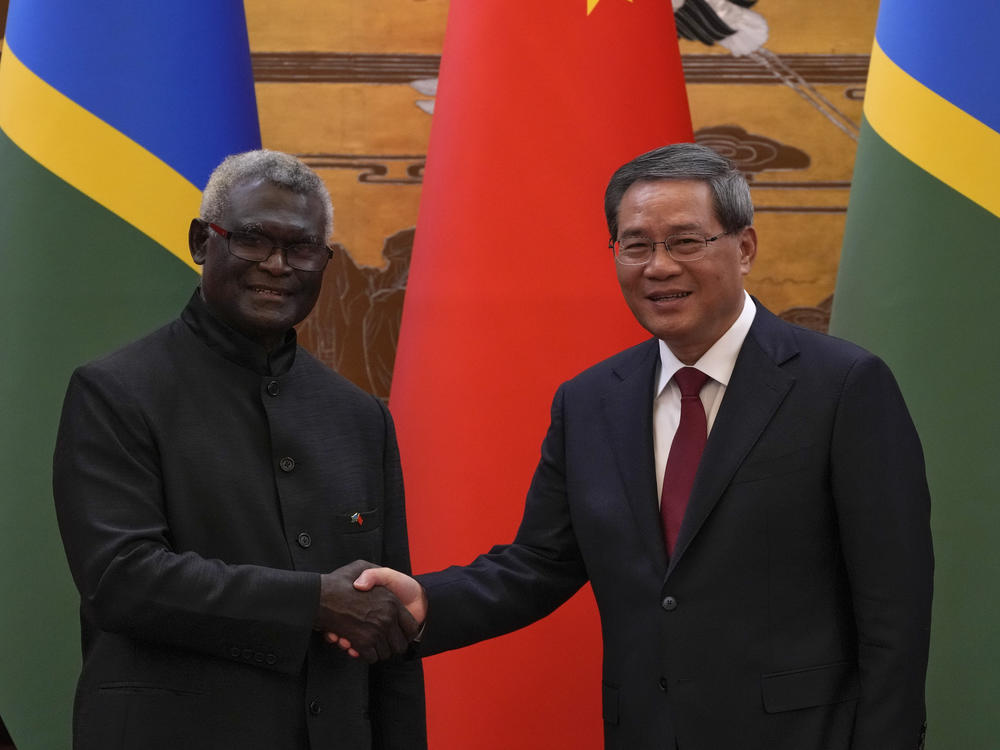Section Branding
Header Content
Solomon Islands signs policing pact with China
Primary Content
BEIJING — The Solomon Islands has signed an agreement to boost cooperation with China on "law enforcement and security matters," in a move likely to raise concerns among the South Pacific island's traditional partners including Australia, New Zealand and the United States.
The agreement, details of which were not immediately released, was contained in a joint statement made public Tuesday following a meeting Monday in Beijing between Chinese Premier Li Qiang and Solomons Prime Minister Manasseh Sogavare.
As part of efforts to build a "comprehensive strategic partnership" the sides agreed to: "Enhance cooperation on law enforcement and security matters. The Chinese side will continue to provide support and help to Solomon Islands as needed in strengthening Solomon Islands' police law enforcement capacity."
Located 2,000 kilometers (1,200 miles) northeast of Australia, Solomon Islands has been China's biggest success in a campaign to expand its presence in the South Pacific. Sogavare's government switched official recognition in 2019 to Beijing from Taiwan, the self-governed island democracy China claims as part of its territory.
The Solomon Islands signed a secretive security agreement with Beijing in 2022 that might have allowed Chinese military forces in the South Pacific. However, Sogavare rejected suggestions his government might give Beijing a military foothold in the region.
The nearby island nation of Kiribati also switched official relations to Beijing in 2019.
China has already provided the Solomons with police training and donated replica guns and riot-control equipment such as water cannon vehicles. A country of 700,000 people made up of six major islands and some 900 smaller ones, the Solomons has seen periods of ethnic tension, during which Australia, New Zealand and other Pacific island nations have committed forces to help restore order.
In the wake of Sogavare's warming relationship with Beijing, the U.S. has committed to reopen an American Embassy in the capital Honiara and it and its allies have increased their engagement with the region as a whole.
Biden convened a summit of Pacific Island leaders in September to unveil a strategy that included cooperation in climate change, maritime security and preventing overfishing. His administration has also promised $810 million in new aid for Pacific Island nations over the next decade, including $130 million to address the effects of climate change.
Sogavare also met with president and head of the ruling Communist Party Xi Jinping on Monday, and the joint statement included a reference to "high-quality" cooperation under Xi's signature ""Belt and Road" blueprint that aims to build ports, highways, power stations and other infrastructure financed by Chinese loans.
The infrastructure project has produced tangible, but not always practical, results for countries lacking other forms of financing and has left many recipients in deep debt to China with little sign of relief.
Solomon Islands has already secured a $66 million loan from the government's Exim Bank of China to erect 161 mobile towers built and run by Chinese communications giant Huawei. In 2018, the Solomons awarded Huawei a contract for an underwater telecom cable network, jointly funded by Australia. China is also building facilities for the islands to host the 2023 Pacific Island Games.
Sogavare has often signed those deals against strong internal opposition and has secured his position by delaying elections in what his opponents have called a power grab.
In the joint statement, Solomon Islands declared it opposed Taiwanese independence and supported China's positions on Hong Kong, Xinjiang, Tibet and other areas where China is criticized for alleged human rights violations. The statement also urged countries to "prudently handle issues such as the discharge of nuclear contaminated water and cooperation on nuclear submarine."
That was a reference to Japan's plan to release treated but still slightly radioactive wastewater into the sea that China has strongly criticized, as well as the Biden administration agreement given the acronym AUKUS with Australia and Britain to provide the first with nuclear-powered submarines in response to China's moving rapidly to expand its military.
Copyright 2023 NPR. To see more, visit https://www.npr.org.

